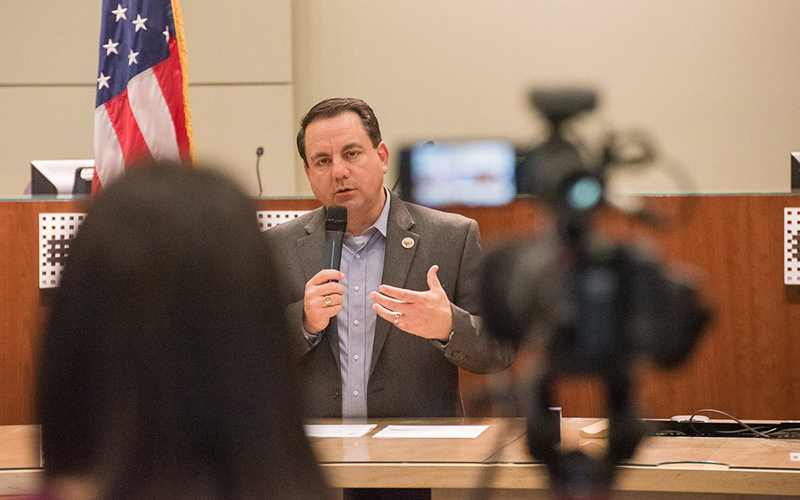
Yuma Mayor Douglas Nicholls declared a state of emergency Tuesday, saying the situation is “above our capacity to sustain.” (Photo courtesy of City of Yuma/Twitter)
Updated Thursday, April 18, 2019
YUMA – Mayor Douglas Nicholls has declared a state of emergency in response to what he described as an overwhelming flow of migrants dropped off by federal officials, and he’s asking for state and federal funds to deal with it.
In the past three weeks, nearly 1,300 migrants from Guatemala, Honduras and El Salvador who are seeking asylum have been released by U.S. Border Patrol at a Salvation Army shelter in Yuma, according to the city’s website.
“There is an imminent threat on having too many migrant releases into our community,” Nicholls said at a press conference Tuesday, “and it’s above our capacity to sustain.”
By declaring a state of emergency, Nicholls is calling on state and federal authorities to provide Yuma with financial assistance in order to maintain the human rights of the migrants, many of whom are fleeing violence and oppression in their native countries.
In a press conference in Yuma on Wednesday, U.S. Senator Martha McSally said the federal government will help the situation in Yuma by putting efforts toward closing loopholes in immigration policy.
“Even if we fully secure the border with the infrastructure, border wall, agents, roads and technology, if these loopholes are not closed, we’re going to continue to have thousands of individuals that are crossing over and taking advantage of these loopholes and overwhelming communities,” she said.
However, McSally did not specify whether or not the federal government will provide funding to Yuma.
“Legislatively at the federal level, I really think our focus needs to be on stopping this flow from happening,” she explained.
Nicholls encouraged other Arizona border communities to declare states of emergency, which would strengthen the request for federal assistance to deal with the crush of migrants.
He said the federal government needs a better organized transportation system for migrants, many who are accompanied by children. Without travel arrangements, migrants end up staying multiple nights at the shelter, causing overcrowding.

“It doesn’t matter where they come from or where they’re going, it’s part of our responsibility as human beings to take care of people,” said Capt. Jeffrey Breazeale, Yuma County coordinator for the Salvation Army. (Photo by Molly Stellino/Cronkite News)
Capt. Jeffrey Breazeale, Yuma County coordinator for the Salvation Army, is helping run the facility, where the migrants are housed and fed before traveling to join family or friends already in the U.S. The migrants eventually will appear before an immigration judge who will decide on asylum requests.
The shelter can comfortably house 150 people, but Breazeale said Wednesday 198 migrants are staying there, and resources are stretched thin.
“Getting to that 200 mark definitely does put a strain on the volunteers, individuals that are helping with day to day tasks, bathrooms, trash, mopping floors, feeding, showers,” he said.
He said he has informed Border Patrol that the shelter, which is fully funded by the Salvation Army, is at its capacity, but federal officials continue releasing migrants.
“We let them know that we’re at our max, but they are still going to release,” he said. “It doesn’t matter if we’re at our max or not.”
The declaration of a state of emergency will not directly affect the operations of the Salvation Army, but he said, it will open up the opportunity for state and federal funding so that volunteers providing basic services to migrants will not have to rely on donations from the community.
AlertMe